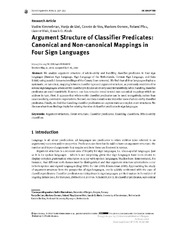Argument Structure of Classifier Predicates : Canonical and Non-canonical Mappings in Four Sign Languages
Kimmelman, Vadim; De Lint, Vanja; De Vos, Connie; Oomen, Marloes; Pfau, Roland; Vink, Lianne; Aboh, Enoch
Peer reviewed, Journal article
Published version

Åpne
Permanent lenke
https://hdl.handle.net/1956/21007Utgivelsesdato
2019-08-08Metadata
Vis full innførselSamlinger
Originalversjon
https://doi.org/10.1515/opli-2019-0018Sammendrag
We analyze argument structure of whole-entity and handling classifier predicates in four sign languages (Russian Sign Language, Sign Language of the Netherlands, German Sign Language, and Kata Kolok) using parallel datasets (retellings of the Canary Row cartoons). We find that all four languages display a systematic, or canonical, mapping between classifier type and argument structure, as previously established for several sign languages: whole-entity classifier predicates are mostly used intransitively, while handling classifier predicates are used transitively. However, our data sets also reveal several non-canonical mappings which we address in turn. First, it appears that whole-entity classifier predicates can be used unergatively, rather than unaccusatively, contrary to expectations. Second, our data contain some transitive uses of whole-entity classifier predicates. Finally, we find that handling classifier predicates can express various complex event structures. We discuss what these findings imply for existing theories of classifier predicates in sign languages.
